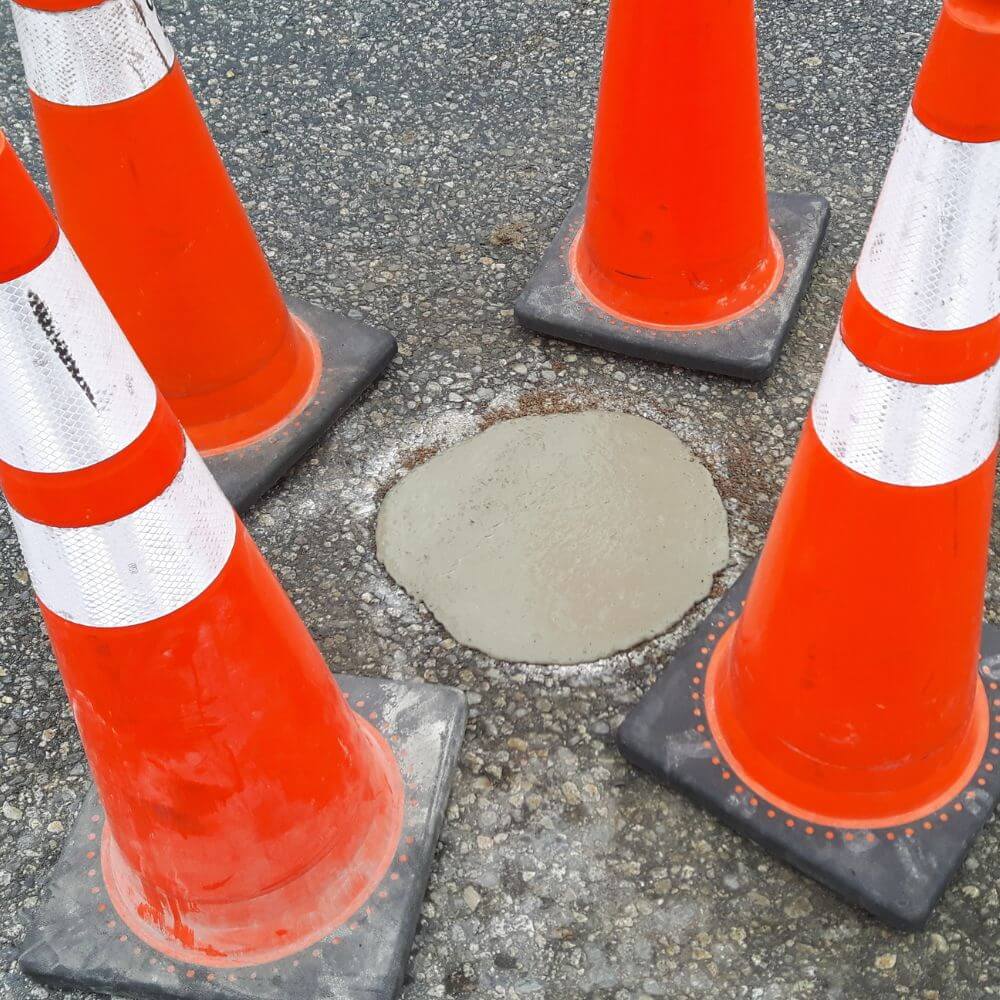Repairing Concrete Holes: The Fast, Easy Way

If you find some holes in your driveway, walkway, patio, or wherever you have a concrete slab, you might feel anxious about how to repair them. You probably think the only way to get rid of deep holes is by filling them with aggregate and compacting them repeatedly. But don’t worry, repairing concrete holes is not nearly as difficult as you think. Let’s explore some simple tricks for repairing concrete holes, from small ones to large ones. or even those that happen sporadically.
What Causes Concrete Holes?
Concrete shrinks when it is wet. and this is normal. When concrete is exposed to the sun, it will harden and shrink again. The concrete inside your home will shrink and expand each season depending on the climate or surrounding humidity. This is normal.
Unfortunately, sometimes concrete in the sun will shrink and crack as well. This can happen if the concrete wasn’t completely cured when poured or if the slab wasn’t installed correctly in the first place. Cracks in concrete can occur in many ways.
Here are a few of the most common causes:
- incorrect concrete mix
- poor installation
- frost damage
- expansion/contraction of the concrete
- and water damage
How to Repair a Concrete Hole
Now that you know what causes the cracks let’s see how to fix them! There are a few different approaches to repairing a hole in your concrete. If your hole is small, you can fill it yourself and use a concrete filler. If you have a larger hole in your driveway, sidewalk, or patio, you may be able to have a professional repair it.
First, you will need to identify what type of hole you have. Holes from corrosion are usually round with a small opening, while holes from cracks are usually square-shaped with a large opening. Cracks can be repaired with cement patching material, while corrosion holes require something more substantial, like epoxy putty or steel mesh reinforcement.
Below are the steps you will need to follow to repair holes in concrete:
1) Clean the area around the hole – remove any dirt and debris with a shovel and sweep away loose soil with a broom.
2) Mix up some quick-setting cement – this type of cement sets within 5 minutes, so it’s perfect for small repairs like this one. Add water, stir well, and pour into the hole until it is full.
3) Fill any gaps between the cement and surrounding surface with dry mortar mix and use your trowel to smooth, ensuring that it reaches all edges and fills in any cracks.
4) The fourth step is to wait for the mixture to dry before applying another layer of concrete on top of it.
3 Easy Ways to Patch a Concrete Hole
Now that you know what causes the holes let’s see how to patch them! If you have a deep hole in your concrete, you’ll want to fill it using a concrete filler. The best way to do this is using a carbide bit drill. You can use a concrete plug for large holes, and you can use a paver repair kit.
There are many ways to patch a hole in the concrete. But there are three of the easiest and most common methods.
1) Concrete Patching Compound – This is an easy way to patch a hole in the concrete. It is recommended for small holes, cracks, and other minor damages.
2) Epoxy – Epoxy is a two-part liquid that can be mixed with just about anything on this list and will harden into something that can be used to patch holes in concrete.
3) 100% solids epoxy resin base – The best way to patch a concrete hole is by applying a 100% solids epoxy resin base. This coating will cover all the imperfections on the surface and provide a smooth finish that will last for years.
There are many ways to patch a hole in the concrete. The easiest way is to use a concrete repair product that contains what you need for the project. A more permanent solution is to pour new concrete over the hole and let it dry before filling it with sand and leveling it with a trowel.
Some people prefer using epoxy resin, which can be purchased at any hardware store, as an alternative to concrete. This process is more complicated than using products from a kit, but if done correctly, the patch will be 100% solids and should last for years without cracking or chipping away.
Concrete is durable, but it can crack and develop small or large holes over time. Fortunately, there are many ways to repair these cracks, and even DIY your patch if you have a small hole in your driveway, patio, walkway, or sidewalk. Remember that you should expect some cracking in concrete driveways and sidewalks, especially if exposed to the elements.
Are your concrete surfaces in need of a fix? Capital Industries is a leading supplier of commercial concrete floor repair products and coatings. Call Capital Industries today at 631-298-6300.


Capital Industries, Inc. is a leading supplier of commercial and industrial concrete repair products. For over 30 years, we have proudly serviced contractors, factories, warehouses and distribution centers for industrial, institutional and commercial customers. We carry a full range of concrete repair materials, including those specifically designed for low temperature areas such as freezers and coolers. Our floor repair products are rapid hardening, allowing you to reopen repaired areas with minimal downtime. All of our products are designed to be used by in-house maintenance personnel and come with an ironclad 100% guarantee of satisfaction.

